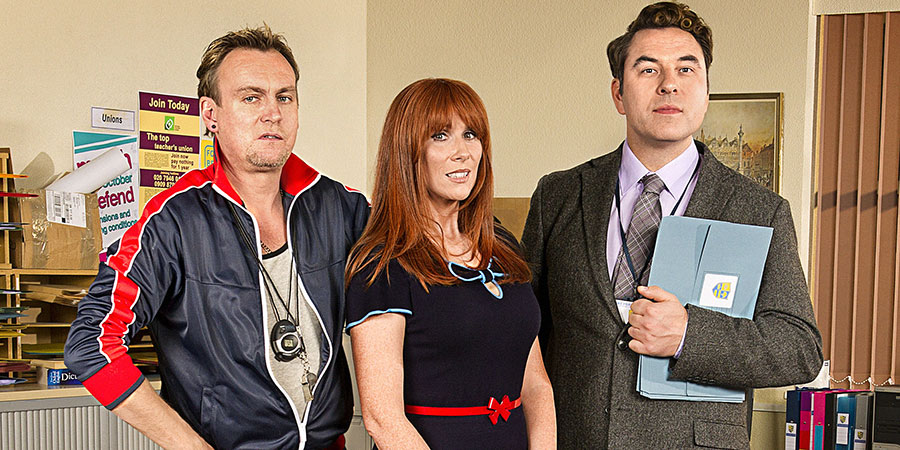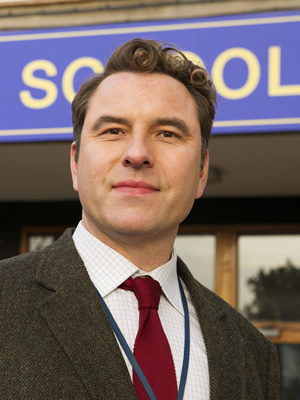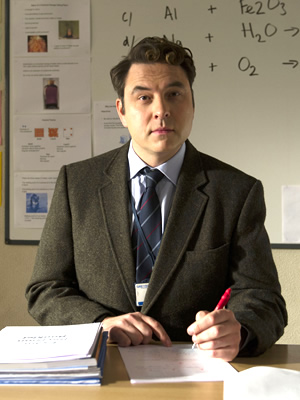David Walliams interview


David Walliams talks about his role in Big School...
Hi David. Could you start by telling us a bit about the show...
So this is a sitcom called Big School, I play Mr Church and my storyline is really that I've fallen in love with Catherine Tate's character Miss Postern on first sight. I'm thinking about leaving the school, I see her and I decide to stay.
What drew you to use school as the context for the show? Was that based on your own memories or experiences of school?
My first thoughts about the show were that I wanted to do something a bit like Remains Of The Day - the story of these two servants who were in love with each other but they can't quite express it. I was thinking what could be the modern take on that? I thought well a school's quite a good environment because you don't get any privacy at school. There's always corridors teaming with kids, staff rooms, dining rooms, whatever. So I thought that could be a rather good setting and I thought it's a universal experience that 99% of us went to school, or have got kids at school. So I thought it was relatable to and I wanted to do a big ensemble piece. I wanted there to be lots and lots of parts for everybody so it's ideal, because of course in any school there are loads and loads of teachers.
Were any of the characters inspired by people you know, or people your co-writers The Dawson Brothers know?
Some of the characters are partly inspired by experiences either I had or The Dawson Brothers had at school. I mean I certainly had teachers like this. I'm meant to be in my forties, unmarried, probably never had a girlfriend, a bit dysfunctional and set in my ways. I certainly had lots of teachers like that at my school. And most people have experienced at some stage in their lives a sadistic PE teacher which is what Philip Glenister is. A head teacher who doesn't really seem to care that much about anything that happens in the school, so they're more like archetypes. Rather than saying "this is exactly based on this specific teacher", it's more about trying to find types. I'm a chemistry teacher, Mr Church, so it's right he would be rather scientific and rather repressed. The world of romance is very alien to him.
Quite a large part of the comedy is people failing to communicate because of certain social deafness on behalf of the characters...
Well a big part, I feel, is the engine of the comedy of this piece is the fact that Miss Postern and Mr Church do like each other but they can never really express it because in their own ways they're both quite repressed characters. Miss Postern thinks about herself as a very urbane person who's experienced so much in life but she's a French teacher who's never been to France. She's never really had any big experiences in life, so a lot of it is about that they can't quite communicate with each other which I feel is often the stuff of comedy.
You've been filming a lot on location with school kids, what's that been like?
It's been great filming with kids. Obviously it's an important part of any show filmed in a school and we've got real kids. We've been on location at a real school in Uxbridge and today we're in a set, but the best thing is it's just fun getting their take on something. And of course we wanted as writers, me and The Dawson Brothers, to get the kids and their dialogue as accurate as possible. I went to school in the 70s and 80s so it's a long time since I've been at school and it's very important that we get their way of speaking. So we listen very carefully to the things they're saying and tinker with the scripts. It's just funny as well because they know us from off the TV so it's fun seeing their responses to us. They've all been really, really sweet. I thought "this is going to be a horror" because they'd be all badly behaved but they were all very well drilled.

Did you have a favourite episode that, when you were writing, you thought 'this is the one I'm looking forward to filming'?
When me and The Dawson Brothers approached this, we really wanted each episode to be as distinct as possible and have a set piece in it. There's an episode for example around a school play, a school trip, a talent show, one around exams, so we always wanted to feel like we wanted to build towards something big. The talent show episode is a lot of fun and I get to play the Oboe as Catherine Tate sings. It felt, as we were doing it, like a lovely moment and I hope that will come across on screen.
Are there any shows that you liken Big School too?
Well it's a hard one. The thing is you just want it to be like the funny shows that are on. It's not particularly trying to be like anything else but you can't help but be influenced by what's gone before. You have to go "oh ok we're doing a sitcom so we've got to think about what other people have done and how things have moved on". So we're not doing it in front of an audience, there won't be a laughter track. Gavin & Stacey was the programme I was thinking of in terms of the tone because it's a heightened reality. It's real life but just not quite. I wanted there to be jokes in this series, I wanted the characters to be quite big but I didn't feel it could be done in front of an audience. It just wouldn't be convincing in terms of assembly scenes, a classroom scene. You just wouldn't be able to get the scale of a school. I also wanted to bring out the emotional life of the characters so I felt that really needs to be something worked on, on locations more than something you'd do on a night in front of an audience. When you do that it becomes a filmed performance.
When you were at school were you devising narratives for your teachers' lives, similar to the ones in the scripts?
I remember being in this department store in Sutton and seeing a couple of my teachers, a physics teacher and a geography teacher, necking. It was mind-blowing because I didn't know they were together in any way. They didn't have the same surname so I didn't know if they were getting married or something. I was like "what are you doing?" So of course Monday morning I tell everybody. You don't often imagine they have any life outside of school. When you're a child you're just quite selfish and think everything revolves around you so you don't appreciate anyone else has lives. I suppose there's a question of power, were I think children en masse in a school do have a lot of power. Like in a dining room when someone drops their plate and everyone jeers them. There's so many of you doing it they can't possibly punish all of you, so at certain points you do have the upper hand on the teachers. I wanted to reflect that, and the sometimes complete disinterest kids have in their teachers. I didn't want this to be an extreme school in any way, like being the poshest public school in the country or the roughest comprehensive. I wanted it to be somewhere in the middle so hopefully anyone can identify it.
What have you enjoyed about working on this series, and what are you hoping the viewers will take away from it?
For me personally I really enjoyed playing one character for an entire series. I'm used to doing sketch shows with Matt (Lucas) and then we'd play four characters a day. This character has got to be a lot realer because you're going to spend a lot more time with them, so I've really enjoyed that journey. I suppose I hope that people find it funny but enjoy that it's a slightly subtler thing from me and enjoy the playing, and a lot of it is in the playing, as opposed to having big gags served up. It's more about the relationships between the characters and the way we relate to each other.

